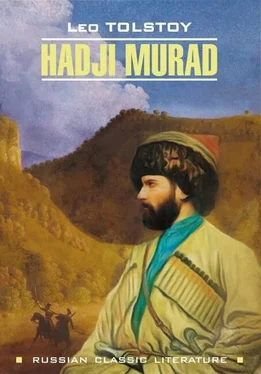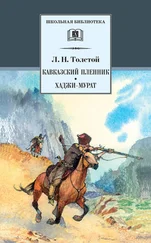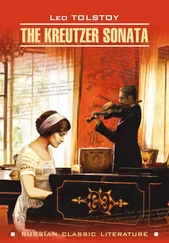The major and the daughter of a surgeon’s orderly, formerly known as Masha, but now generally called by the more respectful name of Marya Dmitrievna, lived together as man and wife. Marya Dmitrievna was a handsome, fair-haired, very freckled, childless woman of thirty. Whatever her past may have been she was now the major’s faithful companion and looked after him like a nurse – a very necessary matter, since he often drank himself into oblivion.
When they reached the fort everything happened as the major had foreseen. Marya Dmitrievna gave him and Butler, and two other officers of the detachment who had been invited, a nourishing and tasty dinner, and the major ate and drank till he was unable to speak, and then went off to his room to sleep.
Butler, having drunk rather more chikhir wine than was good for him, went to his bedroom, tired but contented, and hardly had time to undress before he fell into a sound, dreamless, and unbroken sleep with his hand under his handsome curly head.
The aoul which had been destroyed was that in which Hadji Murad had spent the night before he went over to the Russians. Sado and his family had left the aoul on the approach of the Russian detachment, and when he returned he found his saklya in ruins – the roof fallen in, the door and the posts supporting the penthouse burned, and the interior filthy. His son, the handsome bright-eyed boy who had gazed with such ecstasy at Hadji Murad, was brought dead to the mosque on a horse covered with a barka; he had been stabbed in the back with a bayonet. the dignified woman who had served Hadji Murad when he was at the house now stood over her son’s body, her smock torn in front, her withered old breasts exposed, her hair down, and she dug her hails into her face till it bled, and wailed incessantly. Sado, taking a pick-axe and spade, had gone with his relatives to dig a grave for his son. The old grandfather sat by the wall of the ruined saklya cutting a stick and gazing stolidly in front of him. He had only just returned from the apiary. The two stacks of hay there had been burnt, the apricot and cherry trees he had planted and reared were broken and scorched, and worse still all the beehives and bees had been burnt. The wailing of the women and the little children, who cried with their mothers, mingled with the lowing of the hungry cattle for whom there was no food. The bigger children, instead of playing, followed their elders with frightened eyes. The fountain was polluted, evidently on purpose, so that the water could not be used. The mosque was polluted in the same way, and the Mullah and his assistants were cleaning it out. No one spoke of hatred of the Russians. the feeling experienced by all the Chechens, from the youngest to the oldest, was stronger than hate. It was not hatred, for they did not regard those Russian dogs as human beings, but it was such repulsion, disgust, and perplexity at the senseless cruelty of these creatures, that the desire to exterminate them – like the desire to exterminate rats, poisonous spiders, or wolves – was as natural an instinct as that of self-preservation.
The inhabitants of the aoul were confronted by the choice of remaining there and restoring with frightful effort what had been produced with such labor and had been so lightly and senselessly destroyed, facing every moment the possibility of a repetition of what had happened; or to submit to the Russians – contrary to their religion and despite the repulsion and contempt they felt for them. The old men prayed, and unanimously decided to send envoys to Shamil asking him for help. Then they immediately set to work to restore what had been destroyed.
The second day after the raid, not too early, Butler went out into the street by way of the back door, intending to have a stroll and a breath of fresh air before his morning tea, which he normally took with Petrov. The sun was already clear of the mountains and it was painful to look at the white daub houses where it shone on the right-hand side of the street. It was, though, as cheering and soothing as ever to look left wards at the black tree-clad mountains rising higher and higher in the distance and, visible beyond the ravine, the lusterless chain of snow-capped mountains pretending as always to be clouds.
Butler looked at the mountains, filled his lungs, and felt happy to be alive and to be just who he was, living in this beautiful world. He was quite happy, too, about his conduct the previous day’s action, both during the advance and in particular during the march back when things were quite hot; find he was happy to recall the way Masha, otherwise Marya Dmitrievna (the woman Petrov lived with) had entertained -hem after they had got back from the raid, and the especially unaffected, kindly way she had treated everyone, being particularly nice to him, it had seemed. With her thick plait of hair, her broad shoulders, full bosom, and kindly beaming rice covered with freckles, Marya Dmitrievna could not help attracting Butler who was a young, vigorous, unmarried man, and he even had an idea that she was keen on him. But he thought it would be a shabby way to treat his simple, good-natured comrade and always behaved towards Marya Dmitrievna with the utmost simplicity and respect and it gladdened him that he did so. He was thinking of this just now.
His thoughts were disturbed by the drumming of many horses’ hoofs on the dusty road ahead of him. It sounded like several horsemen galloping. He raised his head and saw at the end of the street a party of riders approaching at a walk. There were a couple of dozen Cossacks with two men riding at their head: one wore a white cherkeska and a tall papakha wound with a turban, the other was a dark, hook-nosed officer in the Russian service, dressed in a blue cherkeska with a lavish amount of silver on his clothing and weapons. The horseman in the turban rode a handsome palomino with a small head and beautiful eyes; the officer was mounted on a tall, rather showy Karabakh. Butler, who was very keen on horses, appreciated at a glance the resilient power of the first rider’s horse and stopped to find out who they were. The officer spoke to him.
“That house of commandant?” he asked, pointing with his whip at Ivan Matveevich’s (Petrov’s) house, and betraying by his accent and defective grammar his non-Russian origin.
“Yes, that’s it,” said Butler. “And who might that be?” he asked, going closer to the officer and with a glance indicating the man in the turban.
“That Hadji Murad. He come here and stay with commandant,” said the officer.
Butler knew about Hadji Murad and that he had surrendered to the Russians, but he had never expected to see him here, in this small fort.
Hadji Murad was looking at him in a friendly fashion.
“How do you do. KosAkoldy,” said Butler, using the Tatar greeting he had learnt.
“Saubul,” replied Hadji Murad, nodding. He rode across to Butler and offered his hand from which his whip hung on two fingers.
“Commandant?” he asked.
“No, the commandant is inside. I’ll go and fetch him,” Butler said to the officer, going up the steps and pushing at the door.
“But the front door”, as Marya Dmitrievna called it, was locked. Butler knocked, but getting no reply went round by the back way. He called for his batman, but got no answer, and being unable to find either of the two boatman went into the kitchen. Marya Dmitrievna was there, with face flushed, her hair pinned up in a kerchief and sleeves rolled up over her plump, white arms. she was cutting pie-cases from a rolled out layer of dough as white as her arms.
“Where have the batmen got to?” asked Butler.
“Gone off drinking,” said Marya Dmitrievna. “What is it you want?”
“I want the door opened. You’ve got a whole horde of mountaineers outside. Hadji Murad has come.”
Читать дальше
Конец ознакомительного отрывка
Купить книгу












